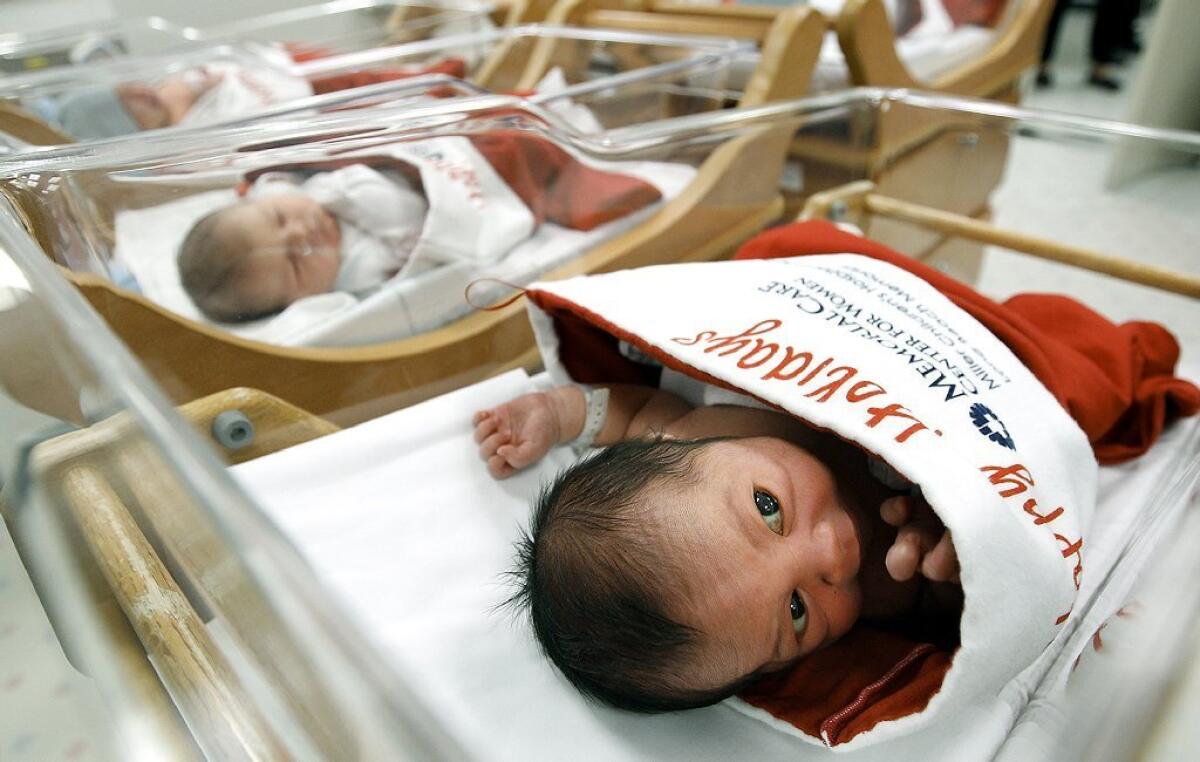Opinion: ‘After Birth’s’ First-World antagonist: low-risk childbirth

- Share via
Guess what’s the most horrible thing a woman can be forced to endure:
Giving birth by cesarean section.
That’s the message of “After Birth,” the new novel about new motherhood by Elisa Albert that has the critics raving like King Lear on the moor. In Albert’s semiautobiographical world of “After Birth,” everything about childbirth these 21st century days is gruesome (starting with the gruesome pun that is the book’s title), but nothing is more gruesome than this:
“They cut me in half, pulled the baby from my numb, gaping cauterized center. Merciless hospital lights, curtain in front of my face. Effective disembodiment. Smell of burning flesh. Sewn back up again by a team of people I didn’t know, none of whom bothered to look me in the eye, not even one of them, not even once. Severed from hip to hip, iced, brutalized, catheterized, tethered to a bed, the tiny birdy’s heartfelt shrieks as they carted him off somewhere hell itself.”
Why, that’s just awful! No one made eye contact! Let’s ban cesareans!
The book’s overeducated first-person narrator, Ari, mother of a 1-year-old forced by circumstances to live in a dismal upstate New York recession town, has much, much more to say about what it means to have a little bundle of joylessness just ruin your life: “A baby opens you up, is the problem.... There’s before, and there’s after.... To live in your body before is one thing. To live in your body after is another.” About babies in general, Ari says, “Even the best are oppressive fascist bastard dictator narcissists.”
Our heroine Ari is so depressed about this awful thing that happened to her called childbirth that she can’t even finish her doctoral dissertation in -- guess what -- women’s studies. Yeah, that cliche. And there are plenty more of them in this book. Ari’s a transplant from hipster-epicenter Brooklyn? Check. Husband’s a sensitive but klutzy college professor? Check. Best friend (and rock musician) Mina’s a transgressive free spirit who gives birth effortlessly to her baby at home? Check. What, is this a serious novel or a “Portlandia”-style satire?
The critics are certainly taking it seriously -- they’re calling it “groundbreaking.” Here are a couple of them falling all over themselves. Merritt Tierce at the New York Times:
“ ‘After Birth’ cuts open the body of literature on mothering, birth, feminism, female friendship, female hateship -- whether academic treatise or poem or novel -- and wrenches out something so new we barely recognize it. Wet, red, slimy, alive: a truth baby.”
And Jonathan Sturgeon at Flavorwire:
“About a quarter of the way through ‘After Birth,’ I became radically astonished by its newness. I felt diminished and enlarged. Obviously on the subjects of pregnancy, child care, and female friendship, I am a know-nothing. But it seemed wrong that the book did not already exist. It was almost as if I had been slighted by its previous nonexistence.”
Even more telling, Albert takes her new novel very seriously indeed. In a recent interview with Slate, she explained that she based Ari’s saga of maternal woe on her own experience with having a baby, which she compared to “dealing with a death.”
Furthermore, Albert revealed to Slate writer Diana Spechler that “After Birth” has an equally serious didactic message:
“At least since industrialization there’s been harm inflicted upon women in birth. The methodologies change with fashion, but the harm remains systemic. Which renders the supposed exaltation of motherhood pretty shallow. Hatred/fear of women’s bodies and pseudoexalting of women’s bodies go hand in hand. One can’t exist without the other.”
Well, let’s see what kind of harm “industrialization” -- the so-called “medicalization of childbirth” -- has actually “inflicted.” Here’s the Centers for Disease Control and Prevention:
“At the beginning of the 20th century, for every 1,000 live births, six to nine women in the United States died of pregnancy-related complications, and approximately 100 infants died before age 1 year.... From 1915 through 1997, the infant mortality rate declined greater than 90% to 7.2 per 1,000 live births, and from 1900 through 1997, the maternal mortality rate declined almost 99% to less than 0.1 reported death per 1,000 live births (7.7 deaths per 100,000 live births in 1997).”
Maybe we have too many cesarean sections in the United States -- but maybe we don’t.
“After Birth” is a textbook example of what I call First World Problem Fiction: The single worst thing that can happen to a woman undergoing a high-risk birth is a skilled medical team paying more attention to what it’s doing than to her personal bout of angst.
Charlotte Allen writes frequently about feminism, politics and religion. Follow her on Twitter @MeanCharlotte
Follow the Opinion section on Twitter @latimesopinion and Facebook
More to Read
A cure for the common opinion
Get thought-provoking perspectives with our weekly newsletter.
You may occasionally receive promotional content from the Los Angeles Times.









